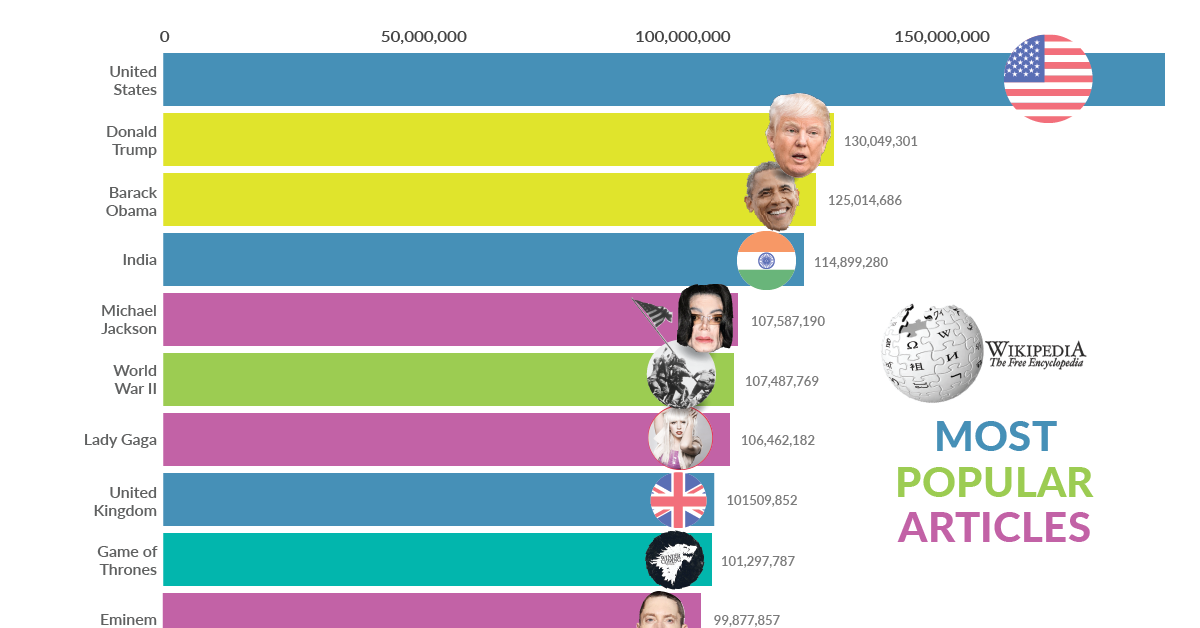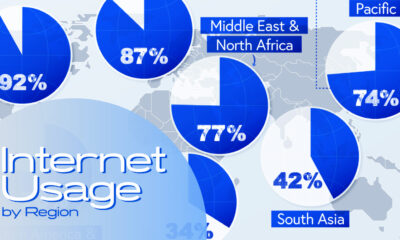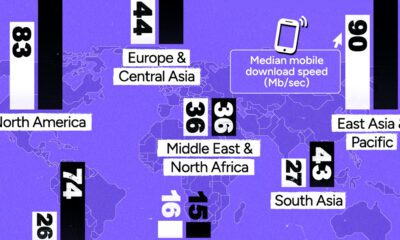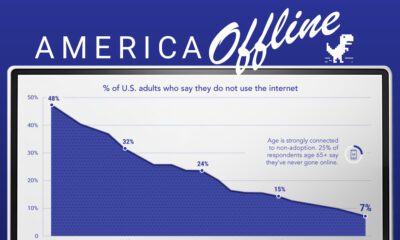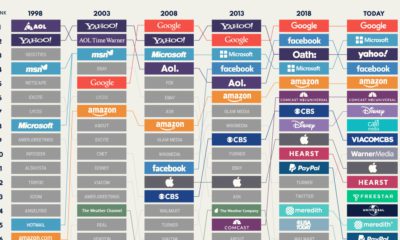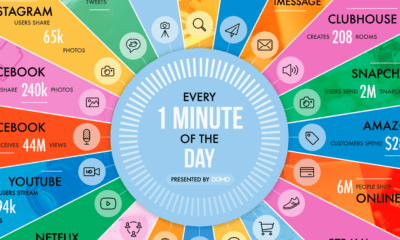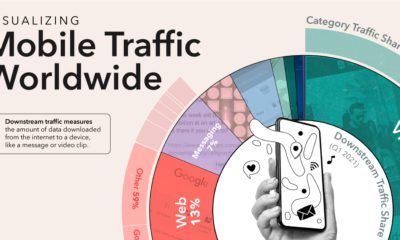Technology
The Most Popular Wikipedia Pages, 2007-2019
The Most Popular Wikipedia Pages, From 2007-2019
Where do you go to satisfy your curiosity about the world? Chances are, most people would turn to Google, where the first search result for virtually any topic is likely to be Wikipedia.
Wikipedia often acts as a quick-and-dirty first source of information—and today’s intriguing animation from Data Geek shows what people are reading about the most. The video highlights more than a decade of the most popular pages on Wikipedia, sorted by total monthly views.
Which topics of interest race to the top?
Note to readers: Page view statistics are only for the English version of Wikipedia, which has nearly 6 million total articles to date.
A One-Stop Shop of Information
Since its 2001 inception, Wikipedia has thrived as an open collaboration project, catapulting it into the ranks of the world’s top websites today. Over the years, the upper limit of views for the most popular pages has dramatically increased.
In 2008, the most popular Wikipedia page belonged to Barack Obama, during his U.S. Presidential campaign, garnering about 3 million views per month. By 2019, the page for the United States took its place at the top, this time soaring to nearly 200 million monthly views.
The 12 most popular Wikipedia pages fluctuate in category, with some expected winners. Throughout the years, World War II shows up consistently in the rankings, likely propelled by research for school assignments.
The U.S. is another undisputed, most-viewed page for nine years in a row (2011-2019). Following the November 2016 U.S. election, pageviews for Donald Trump also leapt into the top three.
Here’s how the most popular pages shake out over a decade:
| Rank | Jan 2008 | Jan 2012 | Jan 2016 | Jan 2019 |
|---|---|---|---|---|
| #1 | Barack Obama | U.S. | U.S. | U.S. |
| #2 | U.S. | Lady Gaga | Barack Obama | Donald Trump |
| #3 | Harry Potter | The Beatles | India | Barack Obama |
| #4 | World War II | Barack Obama | Lady Gaga | India |
| #5 | Kim Kardashian | Michael Jackson | Michael Jackson | World War II |
| #6 | Britney Spears | India | World War II | Michael Jackson |
| #7 | Miley Cyrus | Eminem | Game of Thrones | UK |
| #8 | Sex | UK | Eminem | Lady Gaga |
| #9 | Lil Wayne | Lil Wayne | UK | Eminem |
| #10 | India | World War II | The Beatles | Game of Thrones |
| #11 | Will Smith | Glee (TV) | Justin Bieber | Elizabeth II |
| #12 | UK | Justin Bieber | Adolf Hitler | Adolf Hitler |
Musicians also regularly top the charts, thanks to their illustrious careers and the public’s curiosity about their private lives. Michael Jackson holds a record for longest best-selling artist, but also for one of the most viewed Wikipedia pages, especially after his death in mid-2009.
A Crowdsourced Snapshot of the World
These popular Wikipedia pages provide an interesting angle on current events of the time, although it should be taken with a grain of salt.
For example, the 2008 financial crisis is arguably one of the biggest events of this decade—yet it doesn’t make an appearance in these most viewed pages. One possible reason is that more reputable sources of information exist about the event, as it was widely covered in the media.
Nevertheless, Wikipedia’s mission is to freely share knowledge, relying on over 250,000 monthly volunteers to keep its information accessible by anyone.
Breaking Down Barriers
Boasting over 50 million articles, it’s not hard to see why Wikipedia has reigned supreme as a crowdsourced catalog of information. However, a lesser known fact is that just one man is responsible for a significant chunk of the website’s English-language articles.
In 2017, Steven Pruitt was named one of Time Magazine’s “most influential people on the Internet” for making over 3 million edits and authoring 35,000 original pages on Wikipedia—all for free.
Pruitt is even helping to solve Wikipedia’s gender bias, and has expanded the share of biographical articles about women from 15% to 17.6% in a few short years.
I’m very conscious of what it can mean to make knowledge free, to make information free.
—Steven Pruitt
Technology
Ranked: Semiconductor Companies by Industry Revenue Share
Nvidia is coming for Intel’s crown. Samsung is losing ground. AI is transforming the space. We break down revenue for semiconductor companies.
Semiconductor Companies by Industry Revenue Share
This was originally posted on our Voronoi app. Download the app for free on Apple or Android and discover incredible data-driven charts from a variety of trusted sources.
Did you know that some computer chips are now retailing for the price of a new BMW?
As computers invade nearly every sphere of life, so too have the chips that power them, raising the revenues of the businesses dedicated to designing them.
But how did various chipmakers measure against each other last year?
We rank the biggest semiconductor companies by their percentage share of the industry’s revenues in 2023, using data from Omdia research.
Which Chip Company Made the Most Money in 2023?
Market leader and industry-defining veteran Intel still holds the crown for the most revenue in the sector, crossing $50 billion in 2023, or 10% of the broader industry’s topline.
All is not well at Intel, however, with the company’s stock price down over 20% year-to-date after it revealed billion-dollar losses in its foundry business.
| Rank | Company | 2023 Revenue | % of Industry Revenue |
|---|---|---|---|
| 1 | Intel | $51B | 9.4% |
| 2 | NVIDIA | $49B | 9.0% |
| 3 | Samsung Electronics | $44B | 8.1% |
| 4 | Qualcomm | $31B | 5.7% |
| 5 | Broadcom | $28B | 5.2% |
| 6 | SK Hynix | $24B | 4.4% |
| 7 | AMD | $22B | 4.1% |
| 8 | Apple | $19B | 3.4% |
| 9 | Infineon Tech | $17B | 3.2% |
| 10 | STMicroelectronics | $17B | 3.2% |
| 11 | Texas Instruments | $17B | 3.1% |
| 12 | Micron Technology | $16B | 2.9% |
| 13 | MediaTek | $14B | 2.6% |
| 14 | NXP | $13B | 2.4% |
| 15 | Analog Devices | $12B | 2.2% |
| 16 | Renesas Electronics Corporation | $11B | 1.9% |
| 17 | Sony Semiconductor Solutions Corporation | $10B | 1.9% |
| 18 | Microchip Technology | $8B | 1.5% |
| 19 | Onsemi | $8B | 1.4% |
| 20 | KIOXIA Corporation | $7B | 1.3% |
| N/A | Others | $126B | 23.2% |
| N/A | Total | $545B | 100% |
Note: Figures are rounded. Totals and percentages may not sum to 100.
Meanwhile, Nvidia is very close to overtaking Intel, after declaring $49 billion of topline revenue for 2023. This is more than double its 2022 revenue ($21 billion), increasing its share of industry revenues to 9%.
Nvidia’s meteoric rise has gotten a huge thumbs-up from investors. It became a trillion dollar stock last year, and broke the single-day gain record for market capitalization this year.
Other chipmakers haven’t been as successful. Out of the top 20 semiconductor companies by revenue, 12 did not match their 2022 revenues, including big names like Intel, Samsung, and AMD.
The Many Different Types of Chipmakers
All of these companies may belong to the same industry, but they don’t focus on the same niche.
According to Investopedia, there are four major types of chips, depending on their functionality: microprocessors, memory chips, standard chips, and complex systems on a chip.
Nvidia’s core business was once GPUs for computers (graphics processing units), but in recent years this has drastically shifted towards microprocessors for analytics and AI.
These specialized chips seem to be where the majority of growth is occurring within the sector. For example, companies that are largely in the memory segment—Samsung, SK Hynix, and Micron Technology—saw peak revenues in the mid-2010s.
-
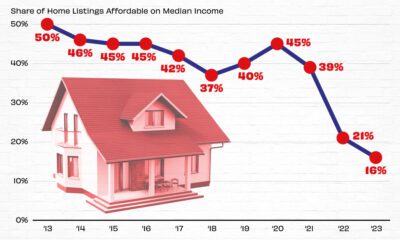
 Real Estate2 weeks ago
Real Estate2 weeks agoVisualizing America’s Shortage of Affordable Homes
-

 Technology1 week ago
Technology1 week agoRanked: Semiconductor Companies by Industry Revenue Share
-

 Money1 week ago
Money1 week agoWhich States Have the Highest Minimum Wage in America?
-

 Real Estate1 week ago
Real Estate1 week agoRanked: The Most Valuable Housing Markets in America
-

 Business2 weeks ago
Business2 weeks agoCharted: Big Four Market Share by S&P 500 Audits
-
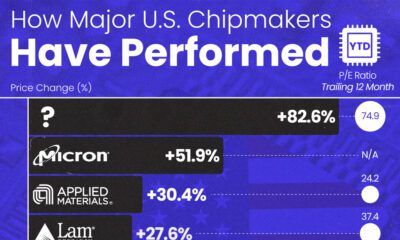
 AI2 weeks ago
AI2 weeks agoThe Stock Performance of U.S. Chipmakers So Far in 2024
-

 Misc2 weeks ago
Misc2 weeks agoAlmost Every EV Stock is Down After Q1 2024
-
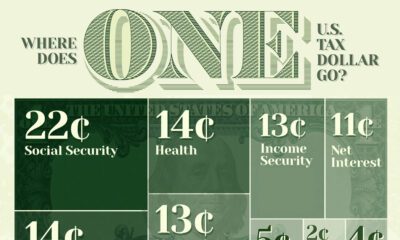
 Money2 weeks ago
Money2 weeks agoWhere Does One U.S. Tax Dollar Go?

